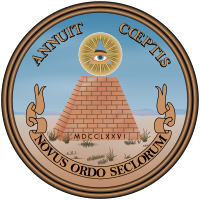Novus ordo seclorum: Difference between revisions
Knowledgeum (talk | contribs) m Reverted edits by 96.227.14.77 to last version by Blueboar (HG) |
m Reverted edits by Knowledgeum to last version by 96.227.14.77 (HG) |
||
| Line 49: | Line 49: | ||
[[ru:Novus Ordo Seclorum]] |
[[ru:Novus Ordo Seclorum]] |
||
[[tr:Novus Ordo Seclorum]] |
[[tr:Novus Ordo Seclorum]] |
||
asfddhfdl ;da daf |
|||
Revision as of 18:38, 30 July 2008

The phrase Novus ordo seclorum (Latin for "New Order of the Ages") appears on the reverse of the Great Seal of the United States, first designed in 1782 and printed on the back of the American dollar bill since 1935. The phrase also appears on the coat of arms of the Yale School of Management, Yale University's business school. The phrase is often mistranslated as "New World Order," but the Latin for that phrase would be Novus Ordo Mundi.
Origin and meaning
The phrase is taken from the fourth Eclogue of Virgil, which contains a passage (lines 5-8) that reads:
| Latin | English |
|---|---|
| Ultima Cumaei venit iam carminis aetas; | Now comes the final era of the Sibyl's song; |
| magnus ab integro saeclorum nascitur ordo. | the great order of the ages is born afresh. |
| iam redit et Virgo, redeunt Saturnia regna, | And now justice returns, honored rules return; |
| iam nova progenies caelo demittitur alto. | now a new lineage is sent down from high heaven. |
The forms saecla, saeclorum etc. were normal alternatives to the more common saecula etc. throughout the history of Latin poetry and prose. The form saeculorum is impossible in hexameter verse: the ae and o are long, the u short by position. For the medieval exchange between ae, æ and e, see Æ; medieval is another example.
Medieval Christians read Virgil's poem as a prophecy of the coming of Christ.
The word seclorum does not mean "secular", as one might assume, but is the genitive (possessive) plural form of the word saeculum, meaning (in this context) generation, century, or age. Saeculum did come to mean "age, world" in late, Christian, Latin, and "secular" is derived from it, through secularis. However, the adjective "secularis," meaning "worldly," is not equivalent to the nominative plural possessive "seclorum," meaning "of the ages."[1]
Thus the motto Novus ordo seclorum can be translated as "A new order of the ages." It was proposed by Charles Thomson, the Latin expert who was involved in the design of the Great Seal of the United States, to signify "the beginning of the new American Era" as of the date of the Declaration of Independence.
See also
References
- ^ Lewis and Short, A Latin Dictionary: Founded on Andrews' Edition of Freund's Latin Dictionary: Revised, Enlarged, and in Great Part Rewritten by Charlton T. Lewis, Ph.D. and Charles Short, LL.D. The Clarendon Press, Oxford, 1879, s. vv.
External links
asfddhfdl ;da daf
